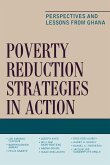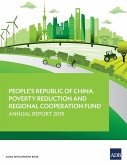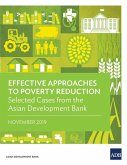Poverty Reduction Strategies in Action
Perspectives and Lessons from Ghana
Herausgeber: Amoako-Tuffour, Joe; Armah, Bartholomew
Poverty Reduction Strategies in Action
Perspectives and Lessons from Ghana
Herausgeber: Amoako-Tuffour, Joe; Armah, Bartholomew
- Gebundenes Buch
- Merkliste
- Auf die Merkliste
- Bewerten Bewerten
- Teilen
- Produkt teilen
- Produkterinnerung
- Produkterinnerung
This book examines the efforts of Ghana to reduce poverty and initiate changes that it believes are essential to ensure a prosperous future for its citizens in the 21st century. It chronicles the achievements, pitfalls, and looming challenges of a government, its people, and its external partners in fashioning out and implementing anti-poverty and pro-growth policies.
Andere Kunden interessierten sich auch für
![Poverty Reduction Strategies in Action Poverty Reduction Strategies in Action]() Poverty Reduction Strategies in Action75,99 €
Poverty Reduction Strategies in Action75,99 €![Tourism and Poverty Reduction Tourism and Poverty Reduction]() Jonathan MitchellTourism and Poverty Reduction61,99 €
Jonathan MitchellTourism and Poverty Reduction61,99 €![People's Republic of China Poverty Reduction and Regional Cooperation Fund People's Republic of China Poverty Reduction and Regional Cooperation Fund]() Asian Development BankPeople's Republic of China Poverty Reduction and Regional Cooperation Fund35,99 €
Asian Development BankPeople's Republic of China Poverty Reduction and Regional Cooperation Fund35,99 €![Evaluation and Poverty Reduction Evaluation and Poverty Reduction]() Evaluation and Poverty Reduction70,99 €
Evaluation and Poverty Reduction70,99 €![Agricultural Entrepreneurship and Poverty Reduction among Farmers Agricultural Entrepreneurship and Poverty Reduction among Farmers]() Mical OtienoAgricultural Entrepreneurship and Poverty Reduction among Farmers37,99 €
Mical OtienoAgricultural Entrepreneurship and Poverty Reduction among Farmers37,99 €![Effective Approaches to Poverty Reduction Effective Approaches to Poverty Reduction]() Asian Development BankEffective Approaches to Poverty Reduction32,99 €
Asian Development BankEffective Approaches to Poverty Reduction32,99 €![Entrepreneurship, Research And Business Management. Remedies For Unemployment And Poverty Reduction In Botswana Entrepreneurship, Research And Business Management. Remedies For Unemployment And Poverty Reduction In Botswana]() Nametsegang TonkopeEntrepreneurship, Research And Business Management. Remedies For Unemployment And Poverty Reduction In Botswana47,95 €
Nametsegang TonkopeEntrepreneurship, Research And Business Management. Remedies For Unemployment And Poverty Reduction In Botswana47,95 €-
-
-
This book examines the efforts of Ghana to reduce poverty and initiate changes that it believes are essential to ensure a prosperous future for its citizens in the 21st century. It chronicles the achievements, pitfalls, and looming challenges of a government, its people, and its external partners in fashioning out and implementing anti-poverty and pro-growth policies.
Hinweis: Dieser Artikel kann nur an eine deutsche Lieferadresse ausgeliefert werden.
Hinweis: Dieser Artikel kann nur an eine deutsche Lieferadresse ausgeliefert werden.
Produktdetails
- Produktdetails
- Verlag: Globe Pequot Publishing Group Inc/Bloomsbury
- Seitenzahl: 366
- Erscheinungstermin: 24. Dezember 2007
- Englisch
- Abmessung: 235mm x 157mm x 26mm
- Gewicht: 744g
- ISBN-13: 9780739110102
- ISBN-10: 0739110101
- Artikelnr.: 23412305
- Herstellerkennzeichnung
- Books on Demand GmbH
- In de Tarpen 42
- 22848 Norderstedt
- info@bod.de
- 040 53433511
- Verlag: Globe Pequot Publishing Group Inc/Bloomsbury
- Seitenzahl: 366
- Erscheinungstermin: 24. Dezember 2007
- Englisch
- Abmessung: 235mm x 157mm x 26mm
- Gewicht: 744g
- ISBN-13: 9780739110102
- ISBN-10: 0739110101
- Artikelnr.: 23412305
- Herstellerkennzeichnung
- Books on Demand GmbH
- In de Tarpen 42
- 22848 Norderstedt
- info@bod.de
- 040 53433511
Edited by Joe Amoako-Tuffour and Bartholomew Armah - Contributions by Jacqueline Vanderpuye-Orgle; Felix Asante; Joseph R.A. Ayee; Abena Oduro; Osei Akoto; William Baah-Boateng; Harry A. Sackey; Daniel K. Twerefou and Osei Asibey
Part 1 Part I. Poverty, Inequality, and Reform Approaches Chapter 2 Chapter
1. Introduction: Poverty Reduction in Ghana Chapter 3 Chapter 2. The
Evolution of Poverty in Ghana: 1960-2000 Chapter 4 Chapter 3. The
North-South Divide and the Disappearing Middle-Class: An Analysis of
Spatial Inequality and Polarization in Ghana Chapter 5 Chapter 4. From SAPs
to PRSPs: A Tale of Two Paradigms or Simply a Tale? Part 6 Part II.
Designing, Implementing, Financing, and Monitoring the GPRS Chapter 7
Chapter 5. Public Consultations, the Role of Civil Servants, and
Development Partners in Ghana's Poverty Reduction Strategy Chapter 8
Chapter 6. Linking Poverty Reduction Strategies to the Budget Chapter 9
Chapter 7. Towards an Architecture for the Delivery of International
Development Assistance Chapter 10 Chapter 8. Monitoring Poverty Reduction
Strategies Part 11 Part III. Special Topics in Poverty Reduction Chapter 12
Chapter 9. Decentralization, Poverty Reduction, and the Ghana Poverty
Reduction Strategy Chapter 13 Chapter 10. Tackling Child Poverty in Ghana
Chapter 14 Chapter 11. Employment Generation for Poverty Alleviation
Chapter 15 Chapter 12. Informal Sector Activities and Urban Poverty in
Ghana: Patterns and Poverty Policy Options Chapter 16 Chapter 13. Achieving
Gender Equity in Ghana: How Useful is the Ghana Poverty Reduction Strategy?
Chapter 17 Chapter 14. Environmental Sustainability and Poverty Reduction
in Ghana Part 18 Part IV. Lessons and What Next Chapter 19 Chapter 15.
Conclusions and Policy Lessons: The Next Generation of Poverty Reduction
Strategies
1. Introduction: Poverty Reduction in Ghana Chapter 3 Chapter 2. The
Evolution of Poverty in Ghana: 1960-2000 Chapter 4 Chapter 3. The
North-South Divide and the Disappearing Middle-Class: An Analysis of
Spatial Inequality and Polarization in Ghana Chapter 5 Chapter 4. From SAPs
to PRSPs: A Tale of Two Paradigms or Simply a Tale? Part 6 Part II.
Designing, Implementing, Financing, and Monitoring the GPRS Chapter 7
Chapter 5. Public Consultations, the Role of Civil Servants, and
Development Partners in Ghana's Poverty Reduction Strategy Chapter 8
Chapter 6. Linking Poverty Reduction Strategies to the Budget Chapter 9
Chapter 7. Towards an Architecture for the Delivery of International
Development Assistance Chapter 10 Chapter 8. Monitoring Poverty Reduction
Strategies Part 11 Part III. Special Topics in Poverty Reduction Chapter 12
Chapter 9. Decentralization, Poverty Reduction, and the Ghana Poverty
Reduction Strategy Chapter 13 Chapter 10. Tackling Child Poverty in Ghana
Chapter 14 Chapter 11. Employment Generation for Poverty Alleviation
Chapter 15 Chapter 12. Informal Sector Activities and Urban Poverty in
Ghana: Patterns and Poverty Policy Options Chapter 16 Chapter 13. Achieving
Gender Equity in Ghana: How Useful is the Ghana Poverty Reduction Strategy?
Chapter 17 Chapter 14. Environmental Sustainability and Poverty Reduction
in Ghana Part 18 Part IV. Lessons and What Next Chapter 19 Chapter 15.
Conclusions and Policy Lessons: The Next Generation of Poverty Reduction
Strategies
Part 1 Part I. Poverty, Inequality, and Reform Approaches Chapter 2 Chapter
1. Introduction: Poverty Reduction in Ghana Chapter 3 Chapter 2. The
Evolution of Poverty in Ghana: 1960-2000 Chapter 4 Chapter 3. The
North-South Divide and the Disappearing Middle-Class: An Analysis of
Spatial Inequality and Polarization in Ghana Chapter 5 Chapter 4. From SAPs
to PRSPs: A Tale of Two Paradigms or Simply a Tale? Part 6 Part II.
Designing, Implementing, Financing, and Monitoring the GPRS Chapter 7
Chapter 5. Public Consultations, the Role of Civil Servants, and
Development Partners in Ghana's Poverty Reduction Strategy Chapter 8
Chapter 6. Linking Poverty Reduction Strategies to the Budget Chapter 9
Chapter 7. Towards an Architecture for the Delivery of International
Development Assistance Chapter 10 Chapter 8. Monitoring Poverty Reduction
Strategies Part 11 Part III. Special Topics in Poverty Reduction Chapter 12
Chapter 9. Decentralization, Poverty Reduction, and the Ghana Poverty
Reduction Strategy Chapter 13 Chapter 10. Tackling Child Poverty in Ghana
Chapter 14 Chapter 11. Employment Generation for Poverty Alleviation
Chapter 15 Chapter 12. Informal Sector Activities and Urban Poverty in
Ghana: Patterns and Poverty Policy Options Chapter 16 Chapter 13. Achieving
Gender Equity in Ghana: How Useful is the Ghana Poverty Reduction Strategy?
Chapter 17 Chapter 14. Environmental Sustainability and Poverty Reduction
in Ghana Part 18 Part IV. Lessons and What Next Chapter 19 Chapter 15.
Conclusions and Policy Lessons: The Next Generation of Poverty Reduction
Strategies
1. Introduction: Poverty Reduction in Ghana Chapter 3 Chapter 2. The
Evolution of Poverty in Ghana: 1960-2000 Chapter 4 Chapter 3. The
North-South Divide and the Disappearing Middle-Class: An Analysis of
Spatial Inequality and Polarization in Ghana Chapter 5 Chapter 4. From SAPs
to PRSPs: A Tale of Two Paradigms or Simply a Tale? Part 6 Part II.
Designing, Implementing, Financing, and Monitoring the GPRS Chapter 7
Chapter 5. Public Consultations, the Role of Civil Servants, and
Development Partners in Ghana's Poverty Reduction Strategy Chapter 8
Chapter 6. Linking Poverty Reduction Strategies to the Budget Chapter 9
Chapter 7. Towards an Architecture for the Delivery of International
Development Assistance Chapter 10 Chapter 8. Monitoring Poverty Reduction
Strategies Part 11 Part III. Special Topics in Poverty Reduction Chapter 12
Chapter 9. Decentralization, Poverty Reduction, and the Ghana Poverty
Reduction Strategy Chapter 13 Chapter 10. Tackling Child Poverty in Ghana
Chapter 14 Chapter 11. Employment Generation for Poverty Alleviation
Chapter 15 Chapter 12. Informal Sector Activities and Urban Poverty in
Ghana: Patterns and Poverty Policy Options Chapter 16 Chapter 13. Achieving
Gender Equity in Ghana: How Useful is the Ghana Poverty Reduction Strategy?
Chapter 17 Chapter 14. Environmental Sustainability and Poverty Reduction
in Ghana Part 18 Part IV. Lessons and What Next Chapter 19 Chapter 15.
Conclusions and Policy Lessons: The Next Generation of Poverty Reduction
Strategies








